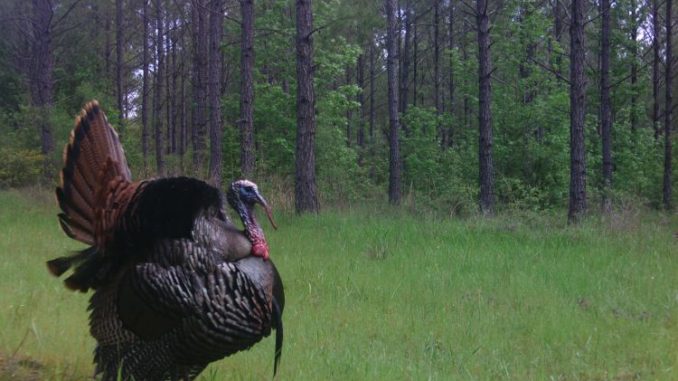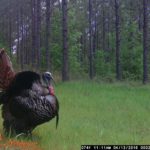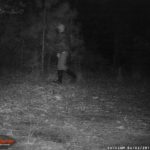
Trespassing and effective ways to deal with it
It was a beautiful morning, a perfect time to be in the woods. The spring gobbler season was underway, but the only birds making any music were the cardinals and blue jays.
Active timber harvest on most of our hunting lease had apparently convinced the turkeys to migrate to places with fewer logging crews.
Not that I minded all that much. After taking a long-beard on opening morning, I was in no hurry to take another gobbler.
It had been fun just watching some crows feed on an abundance of grasshoppers and beetles in the grass and deer browse the new growth of spring.
At mid-morning I called it quits and returned to the pickup. The main road on our hunting lease crosses the boundary of a neighboring lease about a quarter mile east of our camp and continues on out of the woods to the highway.
I had crossed the boundary line (marked with a large sign) and travelled maybe 300 yards down the road when I saw someone up ahead walking east on the road with his back to me.
He was dressed in camouflage and carrying a shotgun. The distance was about 150 yards.
My first thought was this was one of the members of the adjoining hunting club and possibly someone I knew, since some of them had come by the camp and visited from time to time.
But upon hearing the truck, the guy turned around, took a quick look and ran off the road into the woods.
By the time I got to where he had been, he was out of sight and probably still running for wherever he had come from.
Poacher, trespasser, thief or sneak: Call him what you will, but this was yet another lawbreaker hunting where he had no right to be.
I placed a call and left a message for one of the members of the neighboring lease. He called back that evening, and I told him the story and provided what little information I had.
He said a turkey had been doing some gobbling in that area and he was not surprised to have a poacher show up, lured onto the property by the gobbler.
He also said it was not the first trespass incident on the property during this turkey season and described two more recent episodes where members of the lease had encountered trespassers.
Trespassing on private property, as we all know, is a widespread problem and very difficult to deal with.
It occurs for a variety of reasons. Hunting, fishing, theft, vandalism and other illegal activities routinely involve trespass.
We’ll confine our discussion to trespass on property leased or owned for hunting.
Throughout my career, I met with landowners and hunting club members to discuss the problem. I usually got the bad news out of the way first — not expect a lot of help from law enforcement, at least on the front end.
What I meant is that there are simply not enough sheriff’s deputies and wildlife agents to effectively patrol all privately owned land looking for trespassers.
Add to that the fact that law enforcement officers are overwhelmed with other, more urgent calls. Wildlife agents, particularly during hunting seasons, are so busy they have no time for sitting in the woods waiting for trespassers.
What I can tell you is that the sheriff’s departments will respond to trespass incidents when the landowner has information sufficient to lead to an arrest.
Witnesses, license plate numbers, vehicle descriptions, photographs or any other evidence can be used to arrest a trespasser.
But it usually has to come from the landowner or someone willing to testify. Law enforcement will follow up, but the landowner has to provide a place to start.
Wildlife agents patrolling private land will also give the landowner a hand by providing the identity of anyone encountered on the property. It is then up to the landowner to determine whether to have the person arrested.
This policy has worked well for many years and has led to the arrest of a lot of poachers on trespass charges, in addition to wildlife violations.
So what is the best method for addressing poaching and trespassing on private land?
In my opinion the gold standard is boots on the ground. It certainly is not a new idea, and landowners all over the world have employed gamekeepers or range riders (call them what you will) for hundreds of years to combat poaching. It is still a very common and effective practice today.
Unfortunately it isn’t cheap, but well-heeled landowners often employ off-duty deputies or retired officers with commissions from the sheriff’s office to patrol hunting grounds.
Hired security is too costly for most people, but I know of situations where several landowners combined resources to hire a patrolman for their adjoining properties. The costs can be reduced further by hiring someone part-time or only during hunting season.
It is an idea worth considering, particularly where persistent poaching and frequent trespass are problems.
Frequent patrol and presence on the property can be accomplished without the need for hiring someone if we are willing to do it ourselves. I know of several hunting leases with members who are retired or live nearby, and those guys spend time making early morning and late afternoon visits to the property
You don’t have to be a commissioned officer and it does not have to be every day.
The object is to see and be seen at unexpected times and places. Poachers are typically locals living within walking distance. If they frequently see people on the property at odd times and days, most will look for other places to poach.
Look for signs of trespass activity, such as litter, trails or tracks. Cut fences and worn trails usually mean someone is trespassing, and a well-placed game camera might reveal the culprit.
Pay attention and notice things.
Once while driving along a frequently used road on private land, I caught a glimpse of a ladder-type deer stand out in the woods. No one legally hunting the property claimed the stand or even knew it was there.
I did a little scouting and found a footpath leading from the stand to the fence on the property line along a gravel road. A house was a short walk down the road.
A few days later, I apprehended two poachers exiting the property on the path after a morning deer hunt. Neither had licenses or hunter orange.
One of them lived at the nearby house. It was his stand, and not only was it on a good deer trail, but he could also watch the road and knew when anyone on the property went in or out.
When confronting a poacher — particularly an armed one — be calm, firm and above all cautious.
The most important thing to remember is to stay calm. Avoid being overly aggressive. Introduce yourself and ask them to do the same. Try to find out who they are and get as much information as possible while making it clear they are trespassing.
Be sure to get a good physical description, including height, weight, hair and eye color, along with what they are wearing and the type of firearms or archery gear if they have any.
Get a photo on your phone, if possible. Obviously, get license plates and/or make, model and color of ATVs or vehicles.
If the decision is made to have the person arrested ask them to stay and wait for law enforcement. But if they refuse don’t attempt to physically restrain or disarm them. Local law officers usually know who the troublemakers are in a given area and don’t have much trouble finding them later.
It is far better and safer to let the professionals handle enforcement actions.
Remember, too, that law enforcement action is not always necessary. Sometimes a warning will suffice. Just last fall I was on a deer stand one morning, and saw a man and woman walking a dim woods road on the lease.
They were locals, had no guns and the only things they were hunting were arrowheads and petrified wood. I told them who I was, found out who they were and cautioned them about trespassing.
They apologized and departed. No one got excited or angry, and I have not seen the couple since.
Be prepared and have a plan of action to deal with poaching and trespass. Get in contact with the deputies and wildlife agents patrolling your area and ask for their phone numbers. They will be happy to provide them and will likely be able to tell you about poaching that might be ongoing on their beat.
And get together with neighboring landowners and suggest helping each other keep an eye on things.
Now is the time to plan and prepare for an enjoyable and successful hunting season.




